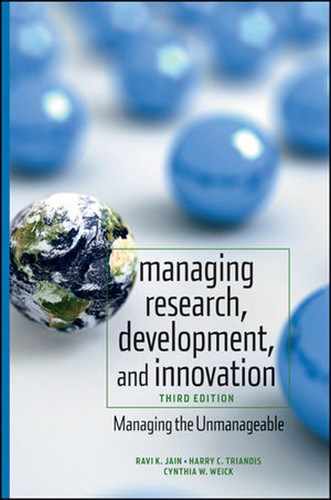15.5. RETHINKING INVESTMENT IN BASIC RESEARCH
The debate about benefits from investment in basic research and how such activities should be managed is likely to continue. Some of the general comments and differing views are summarized as following:
Basic research is a source of fundamental knowledge, leading to innovation, technology development, and economic growth. Basic research is best conducted primarily in universities without political constraints or application-oriented management. Overemphasis on application orientation would be an unmitigated disaster. The contrary view is that all basic research should be tied to application and so managed.
One view is that individual-investigator-initiated research is the only way to produce new ideas. The opposite view is that the researcher-initiated projects would lack a clear understanding of technology and its application and, thus, are not likely to produce good science or robust new ideas for possible utility to society.
Scientific excellence as judged by peer review is the best criterion for research funding, and research funding for basic and applied research should be managed by an individual with technical expertise. The opposing view is that research funding for basic and applied research should not be judged only by scientists. Individuals knowledgeable about application and marketing should have a major role in these decisions. Peer review process is too conservative and is not likely to produce major breakthroughs.
Applied research is likely to restrict creativity and serendipitous discovery. The connection between research results and societal benefits is indirect; this means that high-quality basic research will naturally translate into more benefits for society at large. The opposing view is that investment in basic research can only be justified by the direct benefits to the nation in terms of economic well-being and quality of life. This connection needs to be explicit and not indirect.
Science and technology have served society well. The high standard of living enjoyed in the industrialized countries is a tangible example of this. Investment in basic research, mostly at universities, has contributed greatly to this. The contrary view is that science and technology have not served society well; that is, they are considered to be a Faustian bargain. All benefits have had a darker side even more devastating. Examples are chemicals, drugs, pesticides, and herbicides that are having long-term adverse effects on human health and the environment.
Scientific research conducted at academic institutions has not contributed significantly to international economic competitiveness and national economic well being. Economic benefits as evidenced by commercialization and industrial success from such research have not been fully realized. The other view is that scientific research conducted at universities is only a small part of commercialization and industrial success; the scientific community is being held hostage for the rest of the system failure (Brooks, 1994b).
